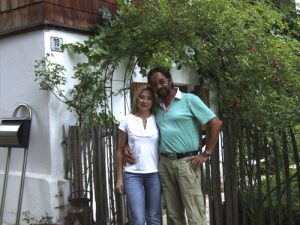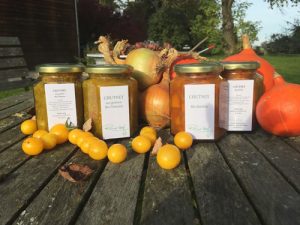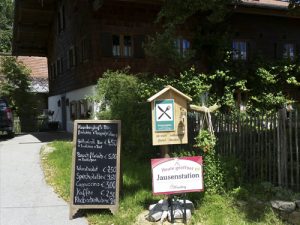Mr. Dapont commenced his farming enterprise in 2009 and focused on preserving old traditions whilst engaging in new innovative initiatives, particularly in organic farming; and creating successful regional networks.
The basis for the company’s success is adopting a cooperative work ethic whilst fostering an entrepreneurial approach.
Area: approx. 20ha
The farmer commenced production in 2009 with 20ha (2.5 ha of his own land) and specializes in farming with traditional animal breeds (cattle, pigs, sheep, geese, chicken). He offers his customers “animal leasing”, in addition to operating a boarding house and a snack station. The latter initiatives utilise produced grown and reared on the farm. The farmer bought a farm with an old traditional building in 2004. He has preserved the cultural heritage by restoring this heritage listed building. The history of this farm can be traced back over a 1,000 years. The main building is 300- 400 years old. The farmer completed the work on the buildings in 2006 and the remaining work has been completed incrementally.
Since 2012, he lives entirely on the income generated from the farm.
As a newcomer to agricultural production, the entrepreneur was open to new and innovative ideas on how to generate an income from a relatively small farm holding. He focused on direct market access and direct marketing, thereby maintaining high-quality niche production in order to keep most of the added value of his products within the company.
1. Cooperation in production:
The farmer works in cooperation with other farmers with respect to animal husbandry. He provides advice to his partners with respect to logistics / procedures and market access.
2. Cooperation in processing
The cooperation with the butcher involves the selection of animals for slaughter and the development of an individual cutting plan for the meat.
3. Cooperation in marketing
In regards to marketing, the farmer cooperates with other farm shops and producers with respect to the product range. In addition to his own farm produce, he also offers products from other regional producers on the farm; e.g. Organic beer and organic wine. There is no contractual regulation for this activity and each individual is free to make their own decisions.
Proximity to the customer and their active involvement in the animal –leasing is particularly important and this is reinforced through marketing campaigns. The marketing also needs to refer to the slaughtering process and the procedures for cutting of the meat at the request of the customer. The cooperation with the butcher offers additional added value.
The agri-tourism at the farm is based on “pitchfork against burnout”. In this context organic agriculture is becoming better known.
Mr. Dapont has a very open approach and ensures maximum transparency in his cooperation with farmers, butchers and regional producers.
In addition to the pig fattening, Mr. Dapont build a larger animal leasing network. He has acquired sufficient knowledge and competencies on building a business within a niche market; to produce high quality meat; and to communicate and network effectively with customers and business partners.
Today, the company is financially stable and it is y sustainable into the future.
Mr. Dapont is aware that cooperation also involves mutual responsibility. He takes this responsibility seriously.
The overall goal is to build customer confidence and bring it closer to organic agriculture. This goes hand in hand with an open culture and communication (print and digital). The entrepreneur wishes to strengthen the understanding of rearing livestock humanely and the added-value which can be generated from organic farming. He sees a great challenge in bringing agriculture and society closer together again.
With regard to the necessary competences for successful cooperation, Mr. Dapont outlines the following:
- Strategic planner
- Determination
- Forward-thinking
- Excellent communicator (between partners and towards customers)
- High individual claim and ambition of every cooperation partner
Mr. Dapont sees his cooperation as very successful. He maintains his openness to further cooperation. He is very well educated and has built up his agricultural knowledge through pursuing educational / training courses. In addition, his learning was enhanced through doing daily tasks on the farm (experiential learning) and, above all, observing animals and nature on the farm.
Due to his former profession he had very good knowledge in commerce and administration. These tasks are becoming routinely more important in the successful running of a farming business.
Advice/Recommendation
“ Think about working with others before you invest yourself without limits! But of course, cooperation is not a one-sided business. It needs the right partner for success. ’’
“ Think about independence from the market and trade, and whether you have opportunities in the network or in cooperation to profitably decouple from the world market and find direct market accesses, which are lucrative! ’’
Queries/Questions
- The farmer is very successful in all his cooperation activities and focuses on quality instead of quantity. In what ways can farms become more environmentally and economically sustainable?
- The farmer is engaged in cooperation activities throughout the entire product cycle: rearing, processing, selling. How can farmers become more actively involved throughout the entire product cycle?



 Čeština
Čeština  English
English  Français
Français  Deutsch
Deutsch  Italiano
Italiano  Slovenščina
Slovenščina  Español
Español 






